Games
“Chicken Sam” to “Kill the Jap”
An arcade game where one tried to shoot a chicken thief was repurposed, after Pearl Harbor, to a game where one sought to nail a Japanese soldier.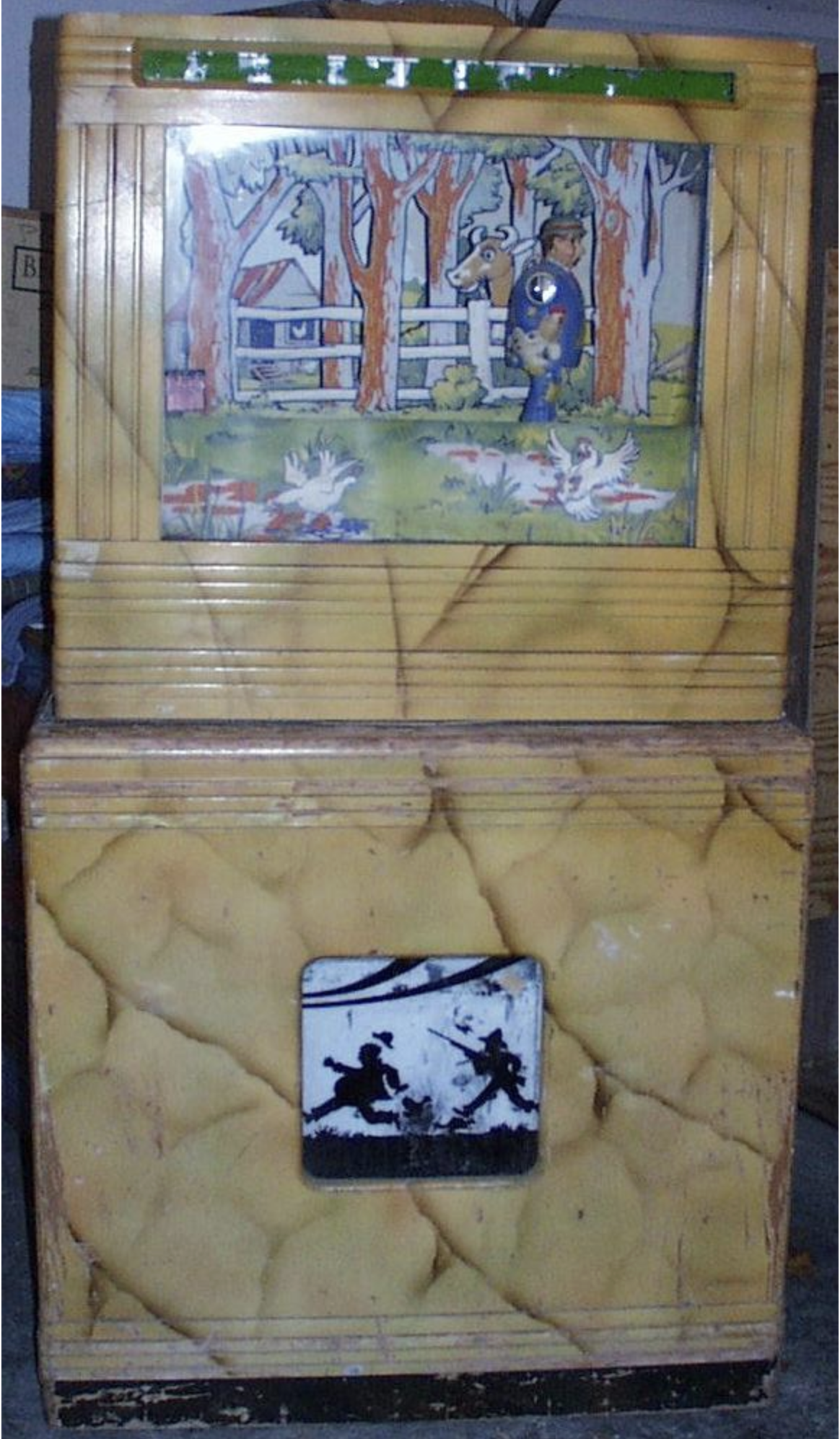

Posted By: Paul - Wed May 03, 2023 -
Comments (1)
Category: Ethnic Groupings, Games, Stereotypes and Cliches, War, 1940s
Dwile Flonking
Posted By: Paul - Tue May 02, 2023 -
Comments (3)
Category: Games, Ridiculousness, Foolishness, Public Ridicule, Silliness, Goofiness and Dumb-looking, United Kingdom, Alcohol
Virtue Board Games
I never knew that "Snakes and Ladders" belonged to this category.Read an excellent short history here.
One example, with description taken from this other site:
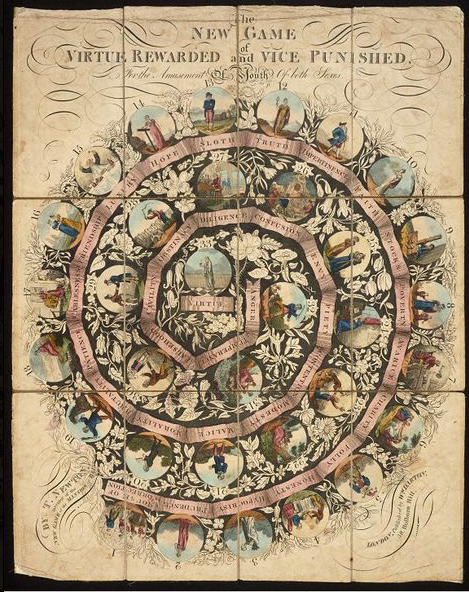
A frankly insane 19th century board game.
The game comes on a series of hand painted paper tiles attached to a thin cloth allowing it to be folded up and put into a drawstring case. When unfolded, it forms a spiral-shaped track on the board going from the outside and running anti-clockwise to the centre. Included are some things to use as counters and a spinner, through which a matchstick can be pushed to form a single-dimensional-rotary d4 equivalent. This is intentional by the makers as they did not want to be seen to be encouraging customers to bring a dice box into private homes. Yes, that is the stated reason as given in the rules to this game, which is described as "for the Amusement of Youth of both Sexes."
Also included are a number of tokens which are handed out to players as they play. Players start at the beginning (i.e. before space 1), roll the dice spin the spinner, which yields a value from 1 to 4 (were d4s available in 1818?), and move that number of spaces. Each space is named with either a Virtue or a Vice and every single one has an effect, usually relating to the rewards that such a virtue might bring (i.e. receiving tokens), or the comeuppance of "the dangerous paths of Vice" which do bad things to the player. Apart from "Hope" which requires the player to "wait with patience until the next turn."
So the players spin, move, and things happen to them, much like the Game of the Goose. It's quite clear from reading the rules, however, that the moral behind the game is highly flawed. Many of the Virtue spaces reward you with "tokens" yet these tokens have zero bearing on the outcome of the game. It is mentioned that the first player to land on the final space (with the whole if you overshoot you must count back rule in effect) "claims the contents of the bank and wins the game" yet there is no indication of what the tokens are for. The first player to the final space, imaginatively named "Virtue," wins regardless of how many tokens everyone has. This means that you could have systematically landed on every vice space imaginable but if you're first to land on the final space exactly, you win regardless of the number of tokens in the bank. The rules also don't specify how many tokens should go in the bank and with the preponderance of "vice" spaces that send you back often a long way, i.e. to "House of Correction" (space 1) or "Stocks" (space 9) a player skilled in fudging spinner spins could well find themselves with an infinite number of tokens. So even if you insert the house rule that the player with the most tokens wins, the player getting to the end "claims the contents of the bank" and therefore has infinity tokens and wins that way.
So what's the real moral message imparted by this game? That stopping to help and be charitable and nice is all well and good but the victory in life goes to whoever barges through the fastest or to the luckiest player. The attempt at inculcating a set of moral values into the youth of both sexes is undermined by the fact that players don't have to make any active choice; at the end of the day, whoever spins the lucky numbers gets the prize at the end of the day.
I can't help but feel that this kid of explains something about Victorian morality though I can't think what.
Posted By: Paul - Fri Feb 10, 2023 -
Comments (0)
Category: Games, Nineteenth Century, Twentieth Century, Ethics and Morals
The Better Sex
Surely this could be rebooted for 2023 in our absolutely carefree and non-contentious cultural atmosphere.The Wikipedia page.
Posted By: Paul - Tue Jan 03, 2023 -
Comments (0)
Category: Games, Rivalries, Feuds and Grudges, Television, Men, Women
Motorway Snooker
In his book Bobby on the Beat, former London policeman Bob Dixon described the game of motorway (or traffic) snooker:Over the years some drivers have filed complaints, claiming to have been victims of motorway snooker.
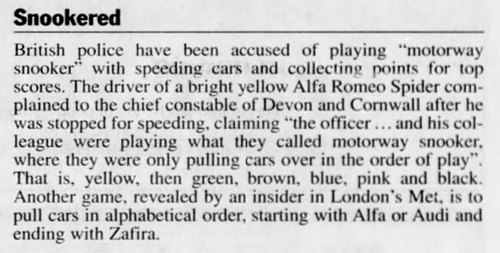
Sydney Morning Herald - Sep 11, 1999
Of course, the official position of the British traffic police is that their officers would not engage in such frivolous games. But that even if they did, all the cars they stopped were speeding anyway.
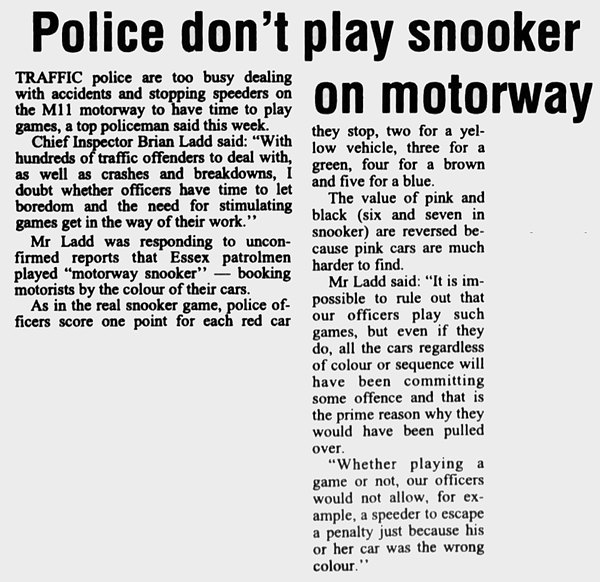
The Herts and Essex Observer - Jan 16, 1992
More info: BBC News
Posted By: Alex - Sat Dec 24, 2022 -
Comments (2)
Category: Games, Police and Other Law Enforcement, Cars
The Decimal Shopping Game
When the UK made its switch from old-style currency to decimal currency, this board game was issued to help familiarize people with the new mode.Currently, a copy is for sale at UK eBay, where more pix await your inspection.
Board Game Geek has just a placeholder entry.
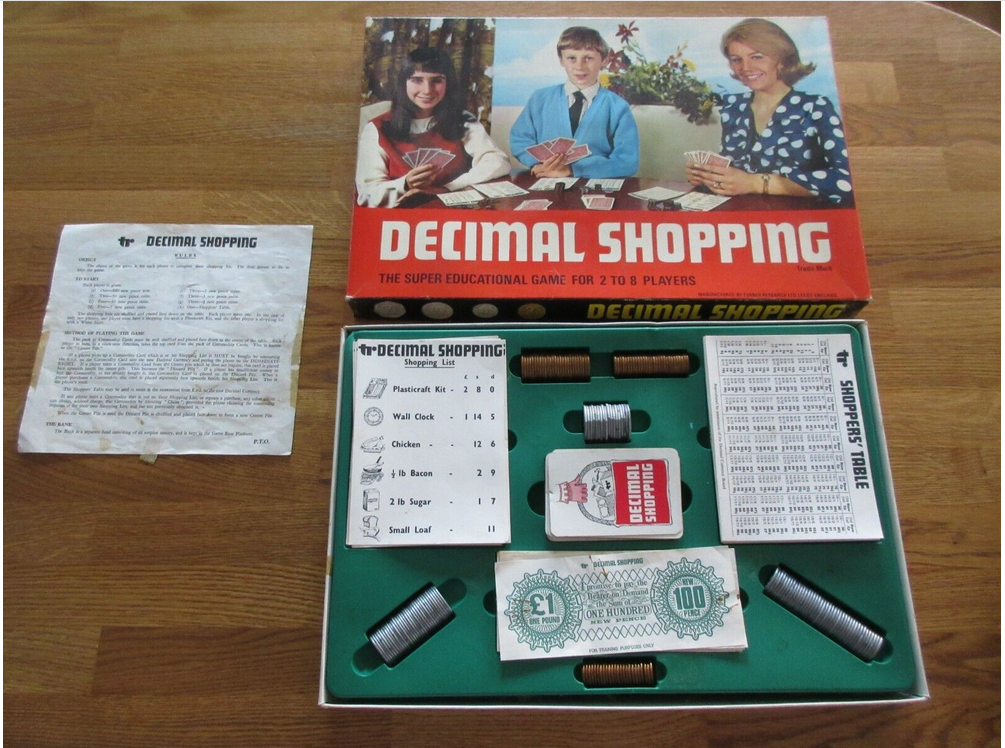
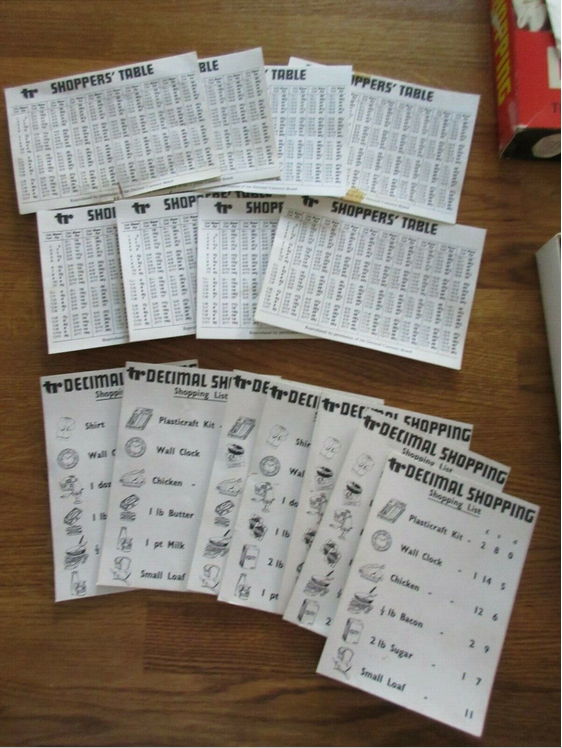
Posted By: Paul - Thu Dec 08, 2022 -
Comments (4)
Category: Boredom, Games, Money, 1970s, United Kingdom
Script-Analyzer, the game
1957: Ideal Toy Co. came out with "Script-Analyzer," the game that promised to let kids psychoanalyze their parents through the magic of handwriting analysis.
NY Daily News - Mar 4, 1957

Vancouver Sun - Apr 2, 1957
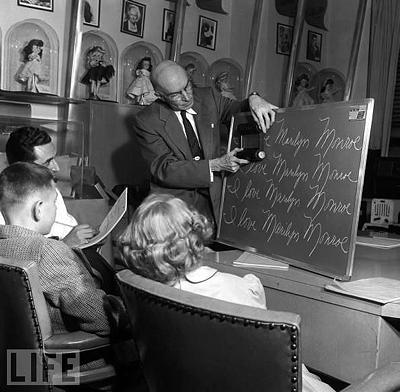
"A handwriting game being analysed by members of the Ideal Toy panel on Inventor's Day at the Ideal Toy Company in Hollis, New York."
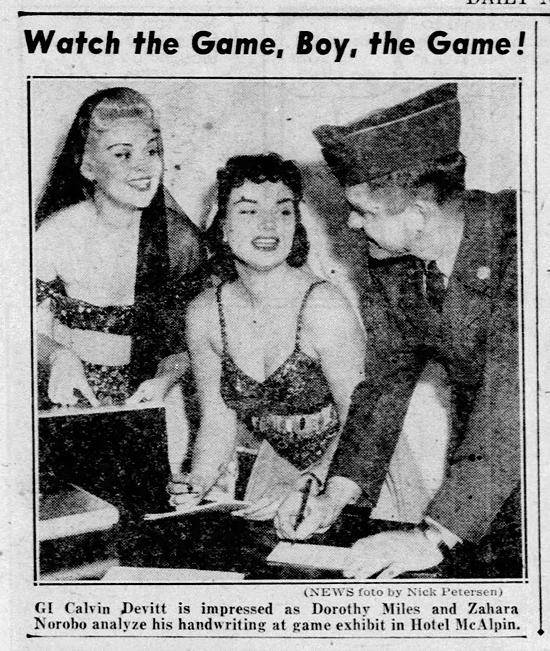
NY Daily News - Mar 5, 1956
Posted By: Alex - Sun Oct 16, 2022 -
Comments (0)
Category: Games, 1950s
Melvin Purvis’s G-Men Detective Game
Play along with current headlines!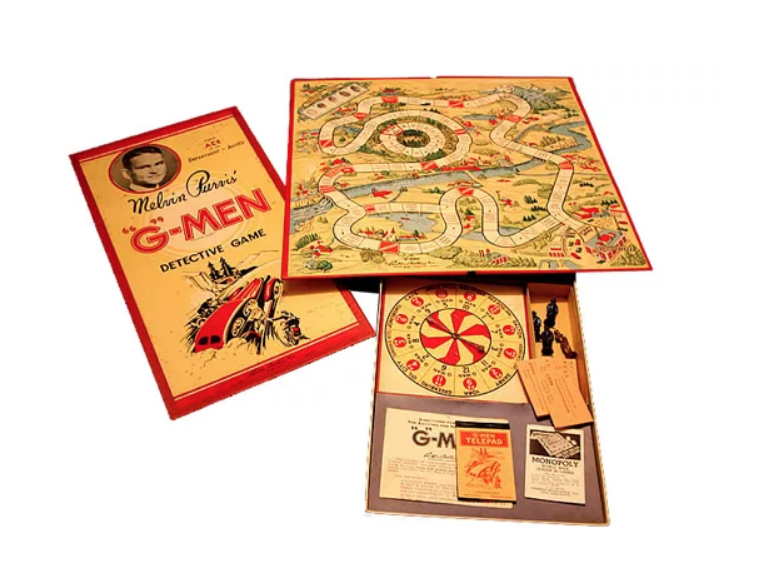
The object of the game is to capture the Public Enemy. The player who brings a G-Man together with the Public Enemy wins the game. The game starts with one G-Man chasing the public enemy, but after 30 minutes a second can be brought into play.
More pix and info here.
Melvin Purvis at Wikipedia.
Posted By: Paul - Sat Aug 13, 2022 -
Comments (0)
Category: Crime, Games, 1930s
Dispatcher: The Board Game
Just as exciting as it sounds!More info here.

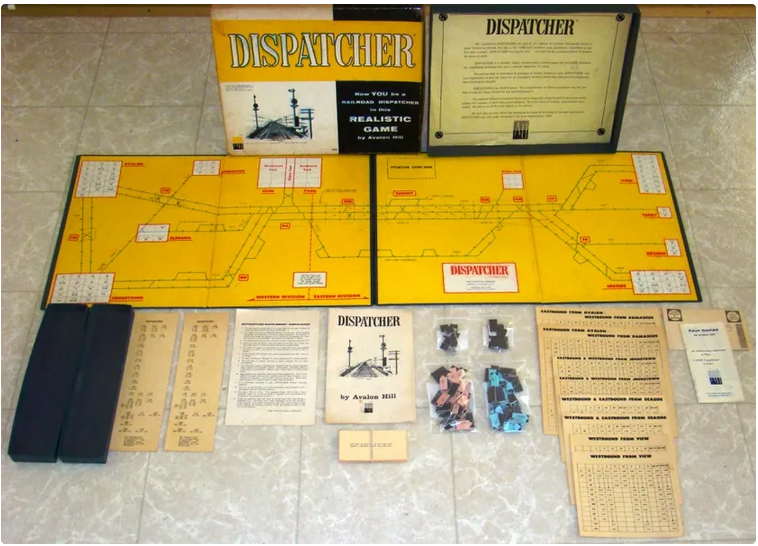
Posted By: Paul - Thu Jun 30, 2022 -
Comments (2)
Category: Boredom, Games, Trains and Other Vehicles on Rails, 1950s
The Gourmet Game
Here's a predecessor for all those competitive cooking shows and restaurant makeover shows.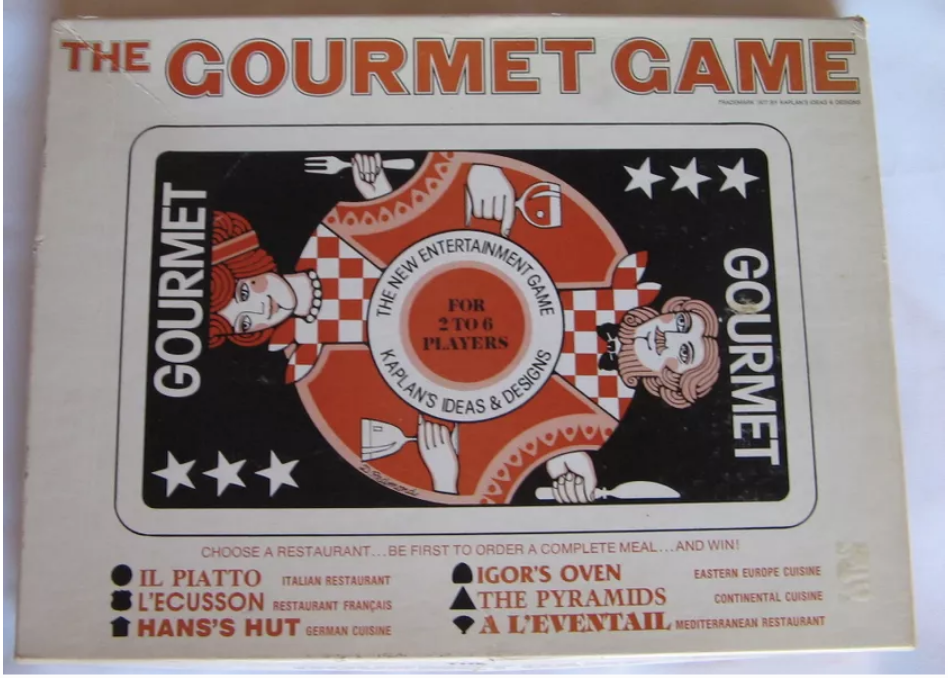
Each player has his own board, which is in the form of a menu. Dishes include classic haute cuisine and are name in English and French (you'll soon learn the French words and their correct pronunciation). Six cards are dealt to each player, and as a player takes new cards from the deck or does discarded by his opponents he gradually puts together a gourmet meal. To win, however, he must order the right dishes and beverages, and must prevent other players from ordering.
Learn more here.
Posted By: Paul - Mon Jun 20, 2022 -
Comments (1)
Category: Food, Games, Stereotypes and Cliches, 1970s

| Who We Are |
|---|
| Alex Boese Alex is the creator and curator of the Museum of Hoaxes. He's also the author of various weird, non-fiction, science-themed books such as Elephants on Acid and Psychedelic Apes. Paul Di Filippo Paul has been paid to put weird ideas into fictional form for over thirty years, in his career as a noted science fiction writer. He has recently begun blogging on many curious topics with three fellow writers at The Inferior 4+1. Contact Us |




